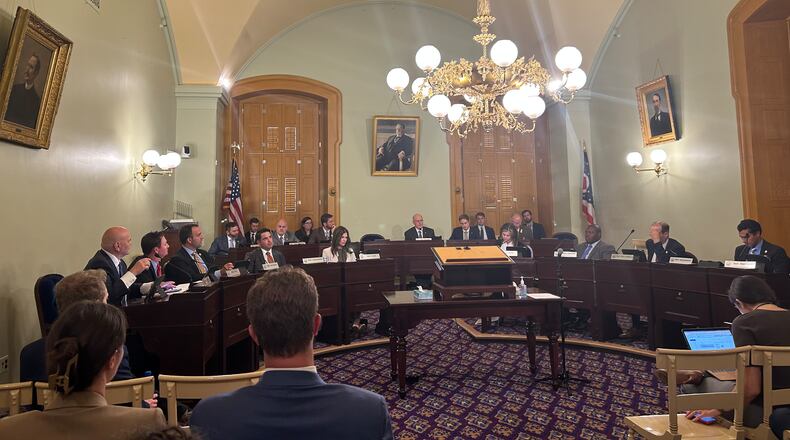HB 187 was introduced for concurrence in the Senate on Oct. 17, and it hasn’t moved since. The Senate Rules and Reference Committee must next assign it to a committee, which will likely be that chamber’s Ways and Means Committee. There are no committee meetings scheduled for this week, and there might not be any next week, either.
Sen. George Lang (R-West Chester Twp.) introduced SB 153 on Sept. 12 which is nearly identical to HB 187 — there have been four hearings but no action in Senate Ways and Means — largely so his colleagues would be familiar with the issues. He wants to move HB 187 forward since the house already passed it and has vowed to get the bill to the governor’s desk by Nov. 16.
“I am confident that we will have this out of session on Nov. 15,” Lang said.
Generally speaking, before legislation passes a given chamber there are three hearings, an introduction to the bill and proponent and opponent testimony. Lang said Sen. Louis Blessing III (R-Colerain Twp.), chairman of the Ways and Means Committee, could combine the first and second hearings or run multiple committee meetings in a week to get it done.
Blessing told the Journal-News mid-November is a bit “aggressive”, and while the will is there to do something for taxpayers, there are many issues to be considered. HB 187 includes a clause that basically flips the switch and put the onus on the state tax commissioner to appeal if there is a dispute with a county auditor over reappraisal numbers.
“I think an argument can be made that corruption can occur,” he said, adding there is already litigation over the power of local county auditors and property valuation.
Blessing said there are also issues with SB 153. He said the senate was supposed to have a “robust caucus” on the issues but it didn’t happen, “so that needs to occur first before we do anything.” He said if they can work through myriad issues, legislation of some kind could be passed in December.
He said they still are considering suggestions by the county auditors association which involves the state paying for a tax break to lessen the blow and adjusting school funding.
The Ohio Homeowners Relief Act, or HB 187, is a response to historic taxable property value hikes — initially upward of 40% in some counties — expected in counties undergoing reappraisals in the wake of pandemic-induced skyrocketing property values. Taxable values are currently projected to increase an average 37% in Butler County.
The bill mandates a three-year, equally weighted average when county auditors value property, instead of just relying on sales from 2022, which officials say were artificially inflated due to the negative impact of the pandemic. The equally weighted data produces an estimated average 25% hike here.
The county auditors association has opposed the bill from the start when Lang tried unsuccessfully to get it inserted in the state budget bill in June. Lang and Butler County Commissioner Don Dixon — who started the whole tax relief crusade — have blamed them for the slow-moving bill that needed to be expedited to make a difference.
“The auditors battled us clear to the end,” Dixon said. “They didn’t let up. The auditors have fought this so hard and so long. They’re whole plan was delay, delay, delay until it got so far down the road and nobody could change it. They accomplished that.”
Warren County Auditor Matt Nolan, who has been speaking for the association, told the Journal-News he wished they would have been consulted at the outset, then it might not have gotten so contentious.
“I wish they would have included us more early, we opposed this and had a lot of ideas over the summer when it was in the budget bill, we were never included,” Nolan said adding now there are many others like the county treasurers and schools on their side. “I get it but normally when you have a bill like this you have interested party meetings, include the auditors association and groups involved, that didn’t happen.”
From the beginning, supporters have said they need a quick fix to “stop the bleeding” caused by the bloated property values this year and put a three-year sunset on the legislation. They always espoused long term, full scale property tax reform.
Nolan said he doesn’t see how the bill is going pass.
“I’m pretty skeptical that anything is going to happen but I didn’t think it was going to get through the house,” he said.
Lang could try to get the bill passed with an emergency clause — so it would take effect immediately — but then the bill would have to return to the House and it is unclear when there might be another house session this year.
Instead, he said he plans to “tweak” another bill that would allow them to credit taxpayers on their second half tax bills for the bigger bills they’ll pay in the first round.
“It’s a little clunky at the end of the year, assuming we are successful on Nov. 15 and the governor signs it,” Lang said. “At the end of year every taxpayer will have some relief but they won’t get the full relief until the second half bills go out.”
About the Author

